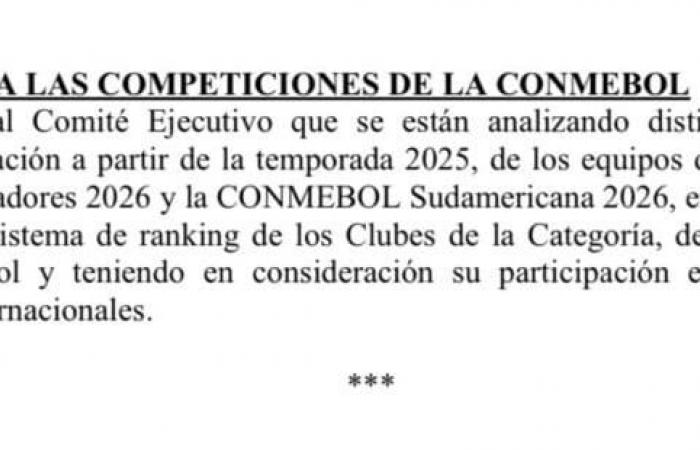Cups represent one of the biggest rewards and challenges in Argentine football every season. Recently, the Asociación del Fútbol Argentino (AFA) began examining how teams will qualify for next year’s international competitions, already raising questions. Who do you think will qualify for these cups in 2026?
Currently, access to the Sudamericana and Libertadores Cups is via the annual ranking. However, a new proposal has been put forward: establishing a ranking-based qualification system, which could diminish the value of the entire season.
How are the places for the cups distributed in Argentine football today?
The Copa Libertadores grants six places for Argentine football. Three of them are reserved for champions: the Copa de la Liga, La Liga and the Copa Argentina, which this year will provide tickets for the two winners of the Copa de la Liga, as well as the winner of the Copa Argentina. The other three places are awarded to the best ranked in the annual table. In addition, a seventh ticket can be added if an Argentine team wins one of these two competitions; This is what happened this year with Racing, which thus moved from the Copa Sudamericana to the Copa Libertadores, recovering one of the two places left vacant by its annual ranking.
The Copa Sudamericana also grants six places, but these are awarded according to the annual table. In a normal season, teams finishing fourth through tenth in the annual table qualify for the Copa Sudamericana. This year, due to the presence of Copa de la Liga champions, only 6th place in the annual table and those above 8th qualified.
What is currently happening with cup qualifying?
A member of the AFA proposed a ranking system taking root from 2020, coinciding with the creation of the Liga Profesional de Fútbol alongside the AFA. This ranking would take into account the performances of the teams in the different tournaments, which have seen their format change several times since 2020, as well as their results in international cups.
This proposal sparked reactions, notably those from Juan Román Riquelme, who expressed his dissatisfaction with the current qualification system. As vice-president of the AFA, he said: “It hurts us not to play in the cup, both finalists should go.” At the time, Riquelme also criticized the fact that teams qualified after finishing in 6th or 7th place in a tournament, which seemed illogical to him, to say the least.
Can the classification for cuts change by 2026?
Without warning, a notification in the official AFA bulletin paved the way for such a development. The message specifies that a possibility of developing a ranking taking into account performances since the start of the Liga Profesional de Fútbol is being evaluated, while including performances in national and international competitions. This mechanism could offer a “detour” and a means of relief to teams going through a difficult season, as Boca recently experienced, who finished out of the 2024 competitions after a delicate period.
These potential changes raise the question of fairness in qualification for international competitions. Could the different visions on qualification modalities change the current balance of Argentine football? This is a debate that deserves further investigation.
Our editors use AI to help them deliver fresh items from trusted sources to our users. If you find any image or content that is inappropriate, please contact us via DMCA form and we will promptly remove it. / Our editors use AI to help them offer our readers fresh articles from reliable sources. If you find an image or content inappropriate, please contact us via the DMCA form and we’ll remove it promptly.
Canada






